Smart car was first made by a collaboration between a German automaker and a Swiss watch company. It was created with the idea that it will revolutionize the urban mobility. But, its been more than 20 years after its conception, the Smart car is still struggling to sell.
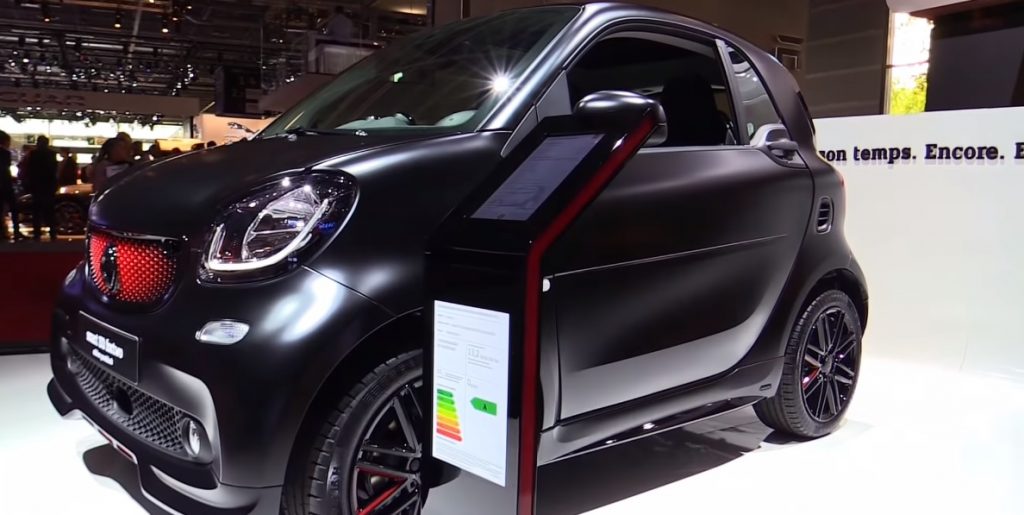
The parent company of Smart, a German automaker Diamler doesn’t disclose financials related to Smart, but it has been estimated by the analysts that the brand is causing huge loses in the range of hundreds of millions of dollars every year.
Now Smart is looking to catch on the EV hype in China. Its preparing to release an electrified version in partnership with Chinese automaker Geely. They’re hoping that Chinese labor will cut manufacturing cost and also give it exposure to the largest auto market in the world. This might be the best chance Smart brand can get to live up to its potential.
History & Origin of Smart
Two odd companies Swatch and Mercedes Benz collaborated to make Smart cars. The founder of Swatch, Nicolas Hayek got the idea for a very small and affordable car that is highly efficient. The idea in his words is that the car is “big enough to hold two people and a case of beer.”
Smart car was targeted towards young urban consumers, therefore it had features suggesting of colorful Swatch watches. Also, the car was meant to have swappable panels, so owners could customize its look. Hayek first tried to partner with Volkswagen, but the deal couldn’t mature, he later went to Mercedes Benz who were already working on small car concepts since the 1970s.
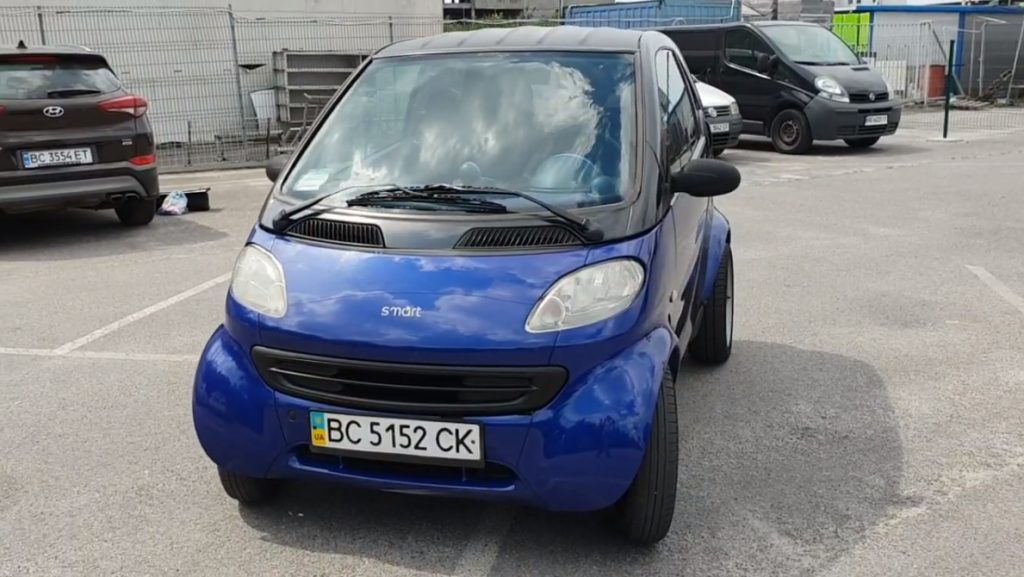
The Smart car made its first appearance at the Frankfurt Auto Show and its production began in 1998. In the same year they were selling these cars to at least 8 countries in the Europe. The car was a success in Europe. The 2008 economic recession played a big role in popularity of Smart cars. Rising fuel prices and dwindling residual income meant that people were looking for affordable cars with great fuel efficiency that are cheaper to maintain.
Smart in United States
The success in Europe caught the attention of Roger Penske. Roger Searle Penske is an American businessman and entrepreneur involved in professional auto racing and formerly a professional auto racing driver himself. He opened a Smart dealership and started importing Smart cars into the United States. He assumed that at least some Americans would want to buy a fuel efficient, small urban car.
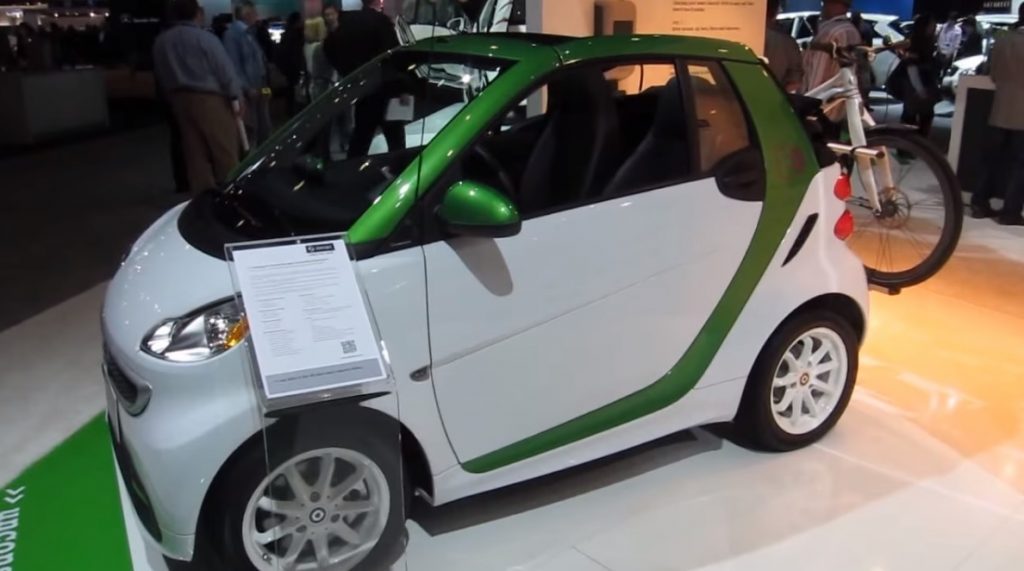
The Smart car was unveiled in the U.S. in 2008 right before the fuel prices skyrocketed and the economy started deteriorating. So, the launch of Smart seemed very timely and relevant to people’s needs who were suffering from a recession. Roger Penske was the sole distributor for Smart cars until 2011 when he relinquished the operations to Daimler AG.
Decline in sales after recovery from recession
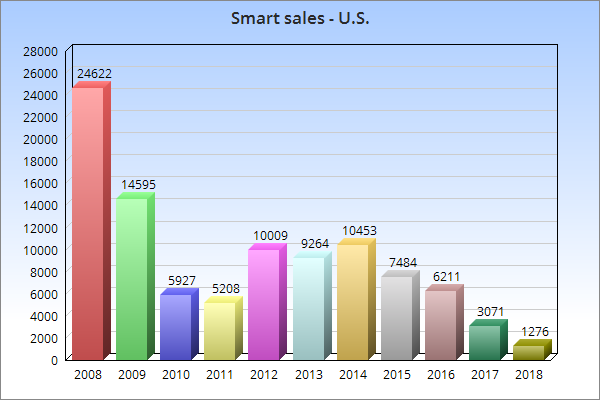
In 2008, 24,622 Smart cars were sold in the U.S. That came down to 14,595 in 2009 and 5,927 in 2010. The rapid fall in sales had to do with economic recovery in America and dwindling gas prices. As is the trend in US, people again stormed to buy SUVs, but now there is also a new trend to catch on, cross-over sports utility vehicles. Consumers actually showed more interest in crossovers than full size and mid size SUVs. It is speculated that the main attraction towards crossover is bigger size but similar fuel economy as compared to sedans. The comfort, higher ride, interior space and lower price than large SUVs also played a big role in catching customer attention. Crossovers are just more practical than sedans and other small cars. Therefore sale of all small cars struggled, but Smart was the worst hit because of its tiny design and little cargo space in the trunk.
The small size of Smart made it easily maneuverable and easy to park, but there were a lot of sacrifices consumers had to make. People preferred four door subcompact cars that were similar in price and fuel economy. Also, out of congested urban areas, Smart is incompatible to the rest of the country. The price of Smart is same as subcompact car, and it costs same to run as subcompact car, then why not get a subcompact car instead and get a lot more luggage space and two extra passenger seats.
There was another aspect which a lot of consumers were concerned about, that is its safety. Despite many promises from the company and four star Euro NCAP rating, people still felt unsafe sitting in a tiny car. There were some other problems as well. It was too under-powered and it had a very bad transmission. The list of sacrifices is huge from an American view with little gain.
Smart’s End in US
Earlier this year in 2019, Smart announced that they are pulling its product from the US market after disappointing sales for many years. There were only 1,276 sales in 2018, down 95% from its peak sales of 24,622 units in 2008. Mercedes-Benz said that they discontinued Smart in U.S. for a number of reasons, primary the declining demand for micro cars in US and Canada.
Smart in Europe
On the other side of the ocean, they have sold far greater number of Smart cars in Europe, but its still not enough to make it profitable for Daimler.

The margins are too thin and labor cost is high. They sold 97,346 united in 2018, but despite strong number of sales it is estimated that Daimler is losing $500 million every year. Automotive market is very competitive these days and its very difficult for companies to be profitable. Anything that has razor thin margin is in tough luck. Analysts say that the main problem is high manufacturing cost because of expensive labor. All Smart cars are manufactured in Smartville, Hambach, France.
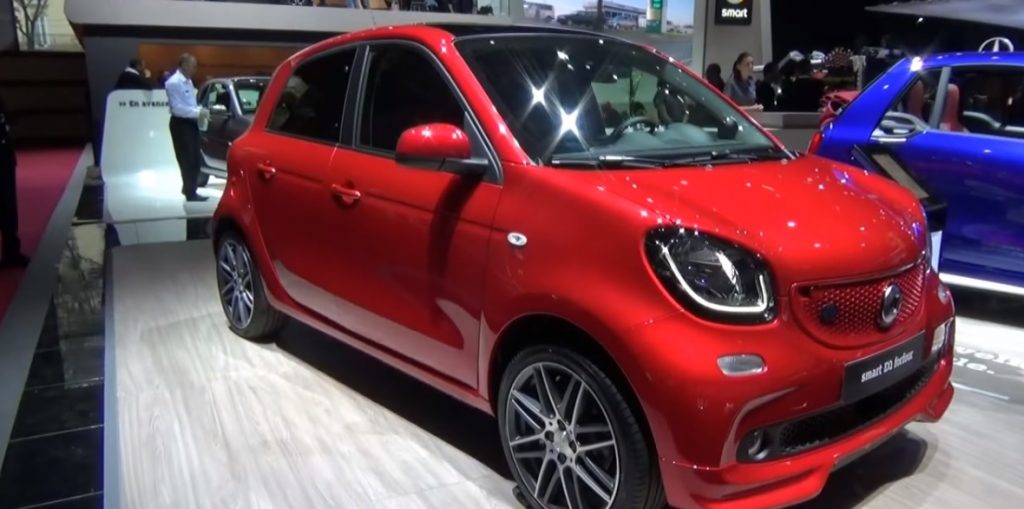
The reason why it sells more in EU has more to do with regulation and its tight urban sprawl. EU has very tight CO2 emission regulations and Smart has very low emissions, its also very easy to maneuver in tight urban European streets. Saving on gas, and low carbon emissions is a powerful selling point for customers in Europe. Clean mobility is Europe’s priority that’s why its automotive fleet is much different than US.
Smart in China
China has plans, and those plans are regarded as perhaps the world’s most ambitious plans for electrification of automobiles. This year Smart made a partnership with Geely which is China’s largest auto-manufacturer. Volvo, a Swedish car making company is also owned by Geely, and recently they have launched a performance based high-end car named Polestar. Just like the Polestar 2, Smart cars will be a fully electric vehicle and will be made in China.

The main attraction for Diamler in this deal is the much lower Chinese labor cost resulting in cheaper manufacturing cost extending the profit margin. This partnership also gives Diamler a chance to sell its Smart cars in the world’s biggest auto market. More than 28 million new vehicles were sold in 2018 alone, and there are more electric cars in China than all other countries combined.
In a few years, Smart cars will be available in Chinese market, and there are a lot of hopes attached to it. It really is the best opportunity Smart will ever get. Lets see how it turns out.










I own a passion smart car, it was so freely donated to myself, so I gave it to my daughter for my oldest granddaughter. This is a very good car. I am so truly grateful and thankful and blessed to have received this vehicle and able to give it to my daughter for my granddaughter this is a true blessing.
I have a smart car and I am just getting used to it …
Is actual competitivity marketplace for all competitors? Where to sell all products that industrial capacity manufacture? Is global market unlimited or somebody lies?